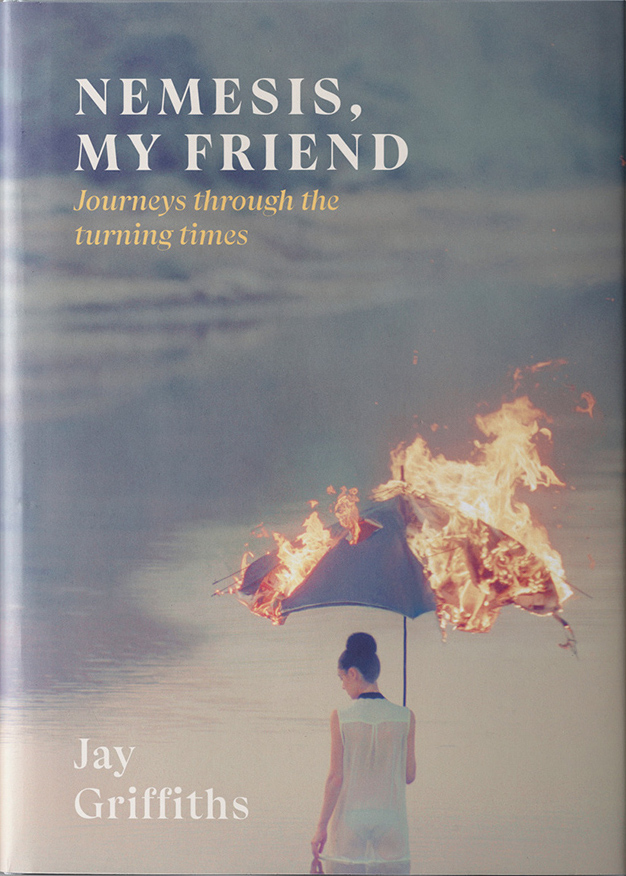Jay Griffiths’ recent essay collection for Little Toller Books might just help us navigate the abyss, writes Anna Fleming.

Jay Griffiths’ almanac-turned-essay collection is a rich tumbling of feeling, lyric and metaphor tackling the many overlapping crises of our times. Climate change, pandemic, lockdown, the Russian war with Ukraine, Brexit, Trump, housing crisis, biodiversity loss and mass extinction: what is our place in nature at this troubled hour? How do we respond to the unsettling quicksand of the world we live in?
Griffiths conjures a riot of words and ideas in response to the concurrent threats. Through a hybrid blend of travel, literature, culture and political analysis, Nemesis charts the author’s insights into our present situation. In these pages, she makes space for grief, anguish, anxiety, anger and hope for Nemesis shares the same restless energy of her natural-political manifesto Why Rebel, but this time it is also deeply personal.
‘My father died during lockdown. There was no funeral.
Those nine words are like nine bells tolled.
My father died during lockdown. There was no funeral.
Heavy iron words.’
From Shakespeare to Welsh mythology, Flamenco dancers, President Zelensky, Borat and Bart Simpson, Griffiths’ storytelling draws together wide-ranging cultural references to create an abundant folklore of our times. While Nemesis was written during lockdown, the book contains many journeys, relating knowledge gained from travels around the world including prior stays with the Inuit in the Arctic and people of the Amazon and Papa New Guinea, who laugh so much they fall over.
The style is both wandering and rooted. Each chapter centres on a theme, like the work of her fellow cultural thinker, Rebecca Solnit, and from these themes Griffiths works with vital sensitivity to draw out connection and meaning. She celebrates bird-song and song-lines, showing how bird and human, land and culture have been woven together through time. ‘I was once told that the Gaelic word fonn means “song” and “state of mind” and “land”, suggesting the idea of a songline, a song of land, held in mind.’
‘Hearth: A Thesaurus of Home’ meditates upon the internal spaces we were confined to over lockdown, dancing through the concept of dwelling and ways of making home, including homes within homes, celebrating the simplest of things, from mugs, to books and hearths, which create the space for heart, body and soul nourishment. ‘Each book in my house is a nest sheltering its author,’ she writes, in a gorgeous image showing how one may find company at home even when living in apparent isolation.
And yet a roof above one’s head has become an unaffordable luxury for too many. Griffiths surveys the territory of our present housing crisis and its deep implications upon individuals and society. With young people priced out of houses, while rental and property prices increase, second home ownership booms and homelessness rises exponentially, Griffiths registers the dire stating of housing within the UK, conjuring killer images to articulate the problem. I have had my share of insecure housing and lived among ghost streets of rural Airbnbs over lockdown; it is good to read Griffiths’ fully articulated protest against systemic failure. Condemning the sad empty shells of second homes, she writes they ‘have the tidied perfection of the grave.’ I couldn’t agree more. The system is rotten.
‘Ours is the age of the Trickster,’ Griffiths pronounces, in a chapter that frames our political turmoil through the archetype of the trickster. With a strong cynical satire she tackles Trump, Johnson, Putin, Brexit and the Ukraine War, illustrating what happens when ‘the clowns are in power.’ In our dangerous post-truth age, metaphors have morphed into reality, and we have placed ‘the trickster not where he belongs, on the edges of society, but at the epicentre of events.’ How do we change this state of affairs?
The counter to Trickster is the namesake of this book. Nemesis, the Greek goddess of retribution whose ‘role is to give people what they are due…Her greatest gift is setting implacable limits’. She is a reminder that we live on a planet of finite resources. She is ‘the goddess for this moment.’ Limitations, Griffiths argues, are what we have forgotten in pursuing the illusion of unfettered, unlimited growth. Paradoxically then, for a book that is bursting with words, images, stories and ideas, the core concept is limitation. But perhaps this is not a paradox at all. In Nemesis, Griffiths reminds us that we already live in a world of plenty; worldly riches are already ours.
The four horsemen are circling. These are trying times to write about the environment. Nature writing is flourishing and yet with extreme weather events and climate change, the tone must alter. Pastoral lyricism is redundant; we must rise and meet a new challenge. Speaking at Wealden Literary Festival, Griffiths explained she feels lucky to be a writer at this moment. ‘There has never been a more important time to write. We need to make these things an ordinary part of our conversation. We have to normalise climate change. We need the stories.’ In Nemesis, Griffiths has given us one such story. This brave, angry, kind and wise book holds an extraordinary flourishing of language to help us navigate the abyss.
*
‘Nemesis, My Friend: Journeys through the Turning Times’ is out now and available here.